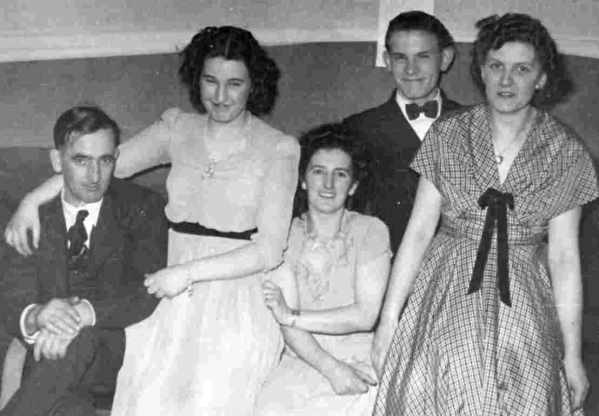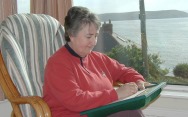CHAPTER 9
The War Ends
Gerry continued to be a tiresome child and gave us a few headaches when she started school. One day the school playground had been laid with new tarmac and with the weather being very hot it remained sticky for quite some time. Gerry thought she would test it to see whether it was firm. She got in a right mess and it took the headmaster a whole week's margarine ration to clean the tar off her hands. We only received a quarter of a pound per person per week and I had to send the whole lot up to the school.
We earned extra money by keeping laying poultry and selling eggs plus keeping cockerels of which we would kill and prepare six each Friday ready for Freddy Harrison to pick up at 6 a.m. on Saturday morning to take to the market at York. In the evenings Leslie would grind barley and Freddy picked that up at the same time. Christmas was always busy as we hand-plucked, dressed and drew the insides of poultry, as many as seventy some years. One Christmas Eve when Freddy came to pick them up there was a bad thunder storm which put out all the electric lights. We rushed about lighting candles as it was important to get the money for the kiddies' Christmas presents. Toys were very difficult to come by for the first few years after the war.
The Co-operative Stores came round to the village fortnightly to pick up the grocery order. I used to save a little money each week in their Christmas Club and then finished paying when the poultry money came in. I remember getting Gerry a lovely big doll that opened and closed its eyes.
 In 1946 we were expecting our fourth child. Again I wasn't too well and this time had to go into the hospital five weeks before she was born. It was an upsetting time as again the family had to be split up. Leslie's family was very good. Margaret and Gerry went away to stay with Leslie's auntie and a sister. Leslie's mother was always there for us and between them they looked after John. Granny was just like a mother to them all. Our babies all seemed alike until their hair grew. Joan, the new baby, was bald for the first six months. It wasn't long before she had beautiful blue eyes and fair, curly hair.
In 1946 we were expecting our fourth child. Again I wasn't too well and this time had to go into the hospital five weeks before she was born. It was an upsetting time as again the family had to be split up. Leslie's family was very good. Margaret and Gerry went away to stay with Leslie's auntie and a sister. Leslie's mother was always there for us and between them they looked after John. Granny was just like a mother to them all. Our babies all seemed alike until their hair grew. Joan, the new baby, was bald for the first six months. It wasn't long before she had beautiful blue eyes and fair, curly hair.
The time came for John to start school. Swearing was never allowed in our home and he was shocked when his best friend, Dick Pulleyne, who started school on the same day, began to swear at his teacher.
We still continued to get lots of complaints about Gerry's behaviour. It became even worse when she moved out of the Infant Class. Although she was naughty the teacher clearly didn't like her and she was blamed for almost everything that went wrong and spent a good deal of her time in the corner with her back to the rest of the class.
Life had almost got back to normal now after the war years except for food rationing. The village cricket team was re-formed and I was elected as Treasurer onto the Ladies' Committee. There were lots of events put on to raise money so that on 'away' games we could hire a bus to take the team and spectators to the matches.
 When I was very young I can remember mam and dad going to dances organized either by the Cricket Club or the Gymkhana Committee. The above photo shows my dad with Pat his sister-in-law sitting on his knee, mother, Roger my mother's younger brother and Kathy my mother's younger sister. Before my youngest brother, Andrew, was born, both mam and dad were very active in the social events of the village. I have very happy memories of being taken to cricket matches, whist drives and even sneaking into the Scout Troup of which my father was leader.
When I was very young I can remember mam and dad going to dances organized either by the Cricket Club or the Gymkhana Committee. The above photo shows my dad with Pat his sister-in-law sitting on his knee, mother, Roger my mother's younger brother and Kathy my mother's younger sister. Before my youngest brother, Andrew, was born, both mam and dad were very active in the social events of the village. I have very happy memories of being taken to cricket matches, whist drives and even sneaking into the Scout Troup of which my father was leader.
On home games I had to provide the teas. This wasn't too bad as Basil Jewitt, the village butcher, would bring the Potted Beef from time to time and we often killed a pig so we usually had some ham available. Basil Jewitt kept wicket well and both players and spectators enjoyed the games especially when we played Hemingborough which was like the Battle of the Roses. All five of my brothers played in the opposing team.
When I had been a girl at home I had been taught how to 'cure' the pigs and now that was my job. In the big Dairy there was a large stone slab on which the Hams and Sides were laid. Salt was rubbed into them before they were covered in salt for saving. Salt Petre was rubbed into the big bone joints.
Margaret was a bright child doing very well at school passing her eleven-plus in 1948 and going to the Girls High School in Selby. This meant that I needed some extra money to buy the new school uniform that could only be bought at 'Rawcliffes' in Leeds. I managed to save up enough money and taking Margaret, Gerry, John and Joan in the pushchair we went to catch the train. What a day that was, nothing seemed to go right. We couldn't get a tunic to fit Margaret as she was a very small child for her age. After getting off the train at Selby we caught the bus home to Cliffe. Walking back from the bus I realised that I had left my handbag, still containing most of the uniform money, on the bus. I sent the family home, ran back to the telephone kiosk and rang the bus depot at Hull. Luckily the bag had been handed in so the uniform money was retrieved. As part of the uniform the girls had to wear round Velour hats trimmed with a school band.
 In September 1951 Joan started school. I seemed lost without any children at home so I got more poultry and during the busy times went out to work on the land. In the spring we would plant potatoes by hand carrying the heavy baskets. This was a real back-aching job before machines were invented which made the job so much easier.
In September 1951 Joan started school. I seemed lost without any children at home so I got more poultry and during the busy times went out to work on the land. In the spring we would plant potatoes by hand carrying the heavy baskets. This was a real back-aching job before machines were invented which made the job so much easier.
By the last week in May the Sugar Beet would be ready for 'striking out' which would be done by hoe. Singling was done by someone following the hoer on their hands and knees, separating the seedlings and leaving just one healthy plant. The women did a lot of the manual work on the land.
Late June and July was Hay time. The Hay would be cut and then made into Haycocks using pitch-forks. These would be left for about a week to dry out and then forked onto a Rulley, taken and made into stacks ready for winter fother when it would be cut out with a Hay Spade.
Summer meant harvesting of Corn that would be cut by a binder pulled by the horses. The women would stook the sheaves leaving them for a day or two to dry after which they would be lead back to the farm to make stacks. If it rained before the Corn could be lead all the stooks would have to be re-made.
No sooner had the harvest been gathered in than the Beet Campaign began. The Beet was loosened by a Beet Plough that broke down the roots leaving the Beet to be lifted by hand and topped with a Beet Knife. I used to work with Jean, Minnie and a few casual women pulling and topping the Beet. The men would load it, take it to Hemingborough Station where it would go by rail to the Sugar Beet Factory at Selby. As soon as farmers acquired tractors with rubber tyres, which travelled well on the road, they would lead it to the factory themselves.
We were all so busy during the next few years but things changed when we found that again we were to have another baby.



